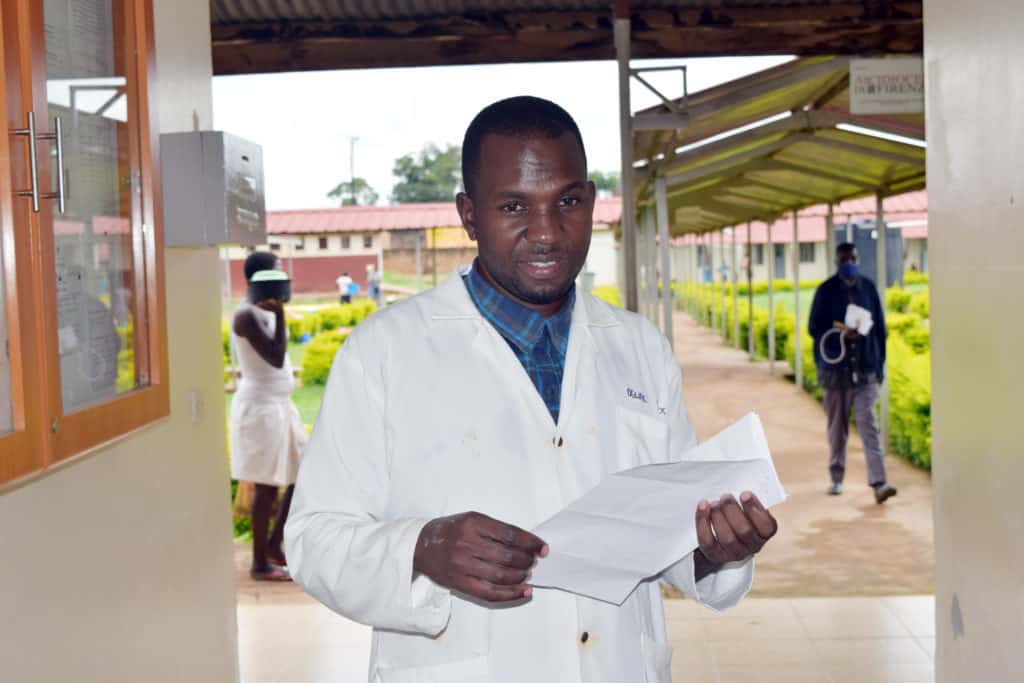This website uses cookies so that we can provide you with the best user experience possible. Cookie information is stored in your browser and performs functions such as recognizing you when you return to our website and helping our team to understand which sections of the website you find most interesting and useful.
In Uganda, A Rural Laboratory
Six years ago, the laboratory at Pope John XXIII’s Aber Hospital in the Oyam District of northern Uganda consisted of two small rooms. Its five staff members had the capacity to conduct just 17 types of tests, among them hemoglobin measurement, malaria microscopy and rapid diagnostic tests, urinalysis, stool analysis, HIV, and syphilis tests.
That small, limited laboratory is now a faded memory. Today, it is a complex of 12 rooms with 12 staff who conduct 45 different types of tests, including complete blood count, electrolyte and hormonal tests, and GeneXpert tests for tuberculosis culture and sensitivity. The extended capacity has increased the number of laboratory clients from 600 to 2,000 a month.
This growth is a result of the hospital’s arduous journey to international accreditation, which it was able to complete with support from the USAID-funded Regional Health Integration to Enhance Services-North, Lango (RHITES-N, Lango) activity. RHITES-N, Lango helped the hospital prepare for audits through frequent mentorships and dry-runs. It also strengthened hospital staff capacity through management review, internal audit, corrective action, preventive action, and scientific communication trainings. RHITES-N, Lango also supported the hospital with internet connectivity to enable timely communications with South African National Accreditation Scheme (SANAS), helped it procure hematology external quality assurance (EQA) panels, and serviced the laboratory’s human diagnostic equipment.
Above: Denis at work in his RHITES-N, Lango-improved lab. PHOTO: Angela Kateemu
In September 2020, as a result of RHITES-N, Lango support, Pope John XXIII’s Aber clinical laboratory became one of five SANAS-approved labs in Uganda, and the only one in northern Uganda.
Looking back at the accreditation process, laboratory manager Denis Aloi said, “At first, it seemed like an impossible undertaking because we didn’t have much in place. It took a lot of sacrifice on the part of the team, funding and buy-in from management, and financial and technical support from USAID RHITES-N, Lango.”
Indeed, the laboratory had struggled for years. When in 2014 it was first audited by the Ministry of Health, it received zero of a possible five stars. This led the laboratory management team to work harder and earn two stars in the next three annual audits. In 2018, the Ministry of Health rolled out the Strengthening Laboratory Toward Accreditation Management (SLMTA) supplemental trainings, which helped the laboratory receive three stars.
Above: Okello Will, Laboratory Assistant takes a blood sample from the client. Photo by: Angela Kateemu
“The hospital undertook great improvements based on the checklist and in August 2018, we got three stars,” said Alex Ogwal, laboratory technologist and quality manager. “During the exit audit conducted by African Society of Laboratory Medicine in November 2018, the laboratory was awarded four stars.” With the four-star rating, the hospital applied for SANAS assessment and on September 23, 2020, the hospital laboratory attained five stars and was recommended for accreditation.
Better lab, better health outcomes
For Alex and his colleagues, having the laboratory accredited is not only an honor for the hospital; it is the team’s crowning glory. “As laboratory personnel, we are now so confident in the results that we give to our clients (doctors and patients). There is great reduction in the delays in the turnaround time of the results and their accuracy is astounding.”
It wasn’t always like this, Alex recalls. “We had issues with client satisfaction because the results took so long, sometimes got lost or the clients would go to other labs to compare the results. Right now, that’s not a problem because the lab has an internal system of comparing and making sure the results are accurate.” These improvements have also reduced use and waste of laboratory resources because staff don’t have to redo tests.

Above: Alex says accreditation has given him and his colleagues more confidence in the results they give the clients. Photo: Angela Kateemu
Denis notes the influx of people from other districts. “Because of these achievements, we have seen a surge in the number of clients coming from neighboring districts like Lira, Apac, Kiryandongo, and Omoro. In a day, we receive 8 to 15 patients from outside districts.”
Fr. Simon Okori, the hospital director, is just as enthusiastic about the honor. “International accreditation is a measure of the quality of results you put out in comparison with other laboratories across the globe. We may be in a rural setting, but we have global standards.”
Story by Angela Kateemu

